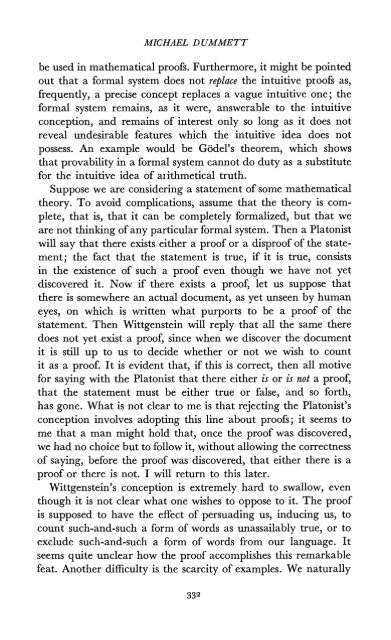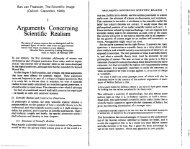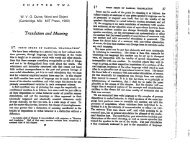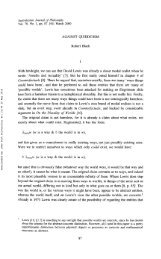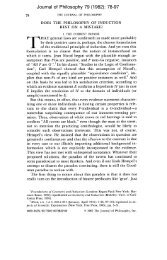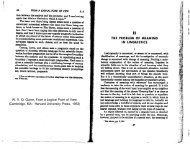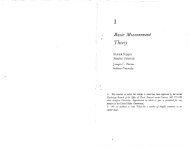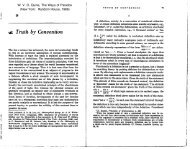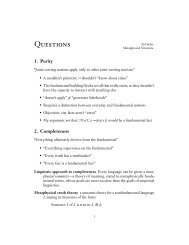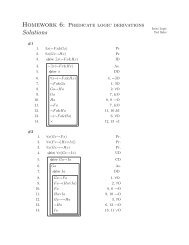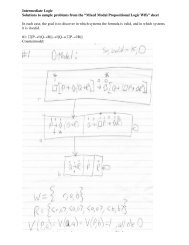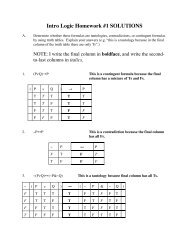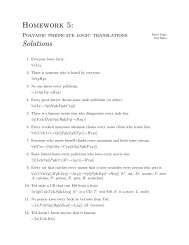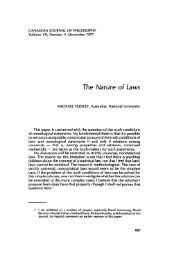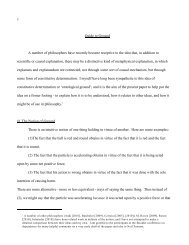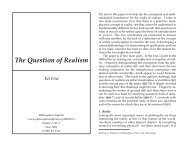Dummett - Wittgenstein's Philosophy of Mathematics.pdf - Ted Sider
Dummett - Wittgenstein's Philosophy of Mathematics.pdf - Ted Sider
Dummett - Wittgenstein's Philosophy of Mathematics.pdf - Ted Sider
You also want an ePaper? Increase the reach of your titles
YUMPU automatically turns print PDFs into web optimized ePapers that Google loves.
MICHAEL DUMMETT<br />
be used in mathematical pro<strong>of</strong>s. Furthermore, it might be pointed<br />
out that a formal system does not replace the intuitive pro<strong>of</strong>s as,<br />
frequently, a precise concept replaces a vague intuitive one; the<br />
formal system remains, as it were, answerable to the intuitive<br />
conception, and remains <strong>of</strong> interest only so long as it does not<br />
reveal undesirable features which the intuitive idea does not<br />
possess. An example would be Gbdel's theorem, which shows<br />
that provability in a formal system cannot do duty as a substitute<br />
for the intuitive idea <strong>of</strong> arithmetical truth.<br />
Suppose we are considering a statement <strong>of</strong> some mathematical<br />
theory. To avoid complications, assume that the theory is com-<br />
plete, that is, that it can be completely formalized, but that we<br />
are not thinking <strong>of</strong> any particular formal system. Then a Platonist<br />
will say that there exists either a pro<strong>of</strong> or a dispro<strong>of</strong> <strong>of</strong> the state-<br />
ment; the fact that the statement is true, if it is true, consists<br />
in the existence <strong>of</strong> such a pro<strong>of</strong> even though we have not yet<br />
discovered it. Now if there exists a pro<strong>of</strong>, let us suppose that<br />
there is somewhere an actual document, as yet unseen by human<br />
eyes, on which is written what purports to be a pro<strong>of</strong> <strong>of</strong> the<br />
statement. Then Wittgenstein will reply that all the same there<br />
does not yet exist a pro<strong>of</strong>, since when we discover the document<br />
it is still up to us to decide whether or not we wish to count<br />
it as a pro<strong>of</strong>. It is evident that, if this is correct, then all motive<br />
for saying with the Platonist that there either is or is not a pro<strong>of</strong>,<br />
that the statement must be either true or false, and so forth,<br />
has gone. What is not clear to me is that rejecting the Platonist's<br />
conception involves adopting this line about pro<strong>of</strong>s; it seems to<br />
me that a man might hold that, once the pro<strong>of</strong> was discovered,<br />
we had no choice but to follow it, without allowing the correctness<br />
<strong>of</strong> saying, before the pro<strong>of</strong> was discovered, that either there is a<br />
pro<strong>of</strong> or there is not. I will return to this later.<br />
<strong>Wittgenstein's</strong> conception is extremely hard to swallow, even<br />
though it is not clear what one wishes to oppose to it. The pro<strong>of</strong><br />
is supposed to have the effect <strong>of</strong> persuading us, inducing us, to<br />
count such-and-such a form <strong>of</strong> words as unassailably true, or to<br />
exclude such-and-such a form <strong>of</strong> words from our language. It<br />
seems quite unclear how the pro<strong>of</strong> accomplishes this remarkable<br />
feat. Another difficulty is the scarcity <strong>of</strong> examples. We naturally<br />
332


